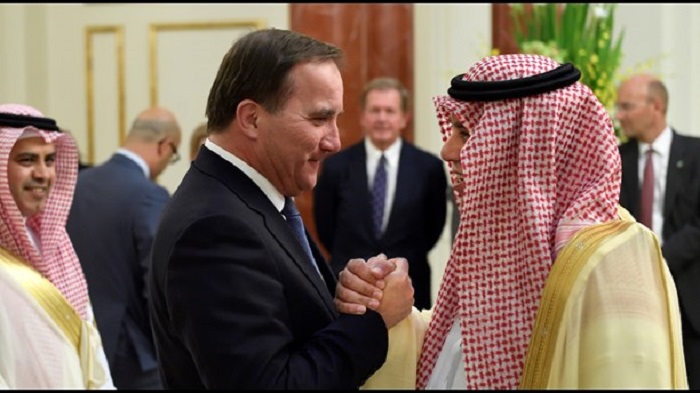Alwaght- The Swedish Prime Minister Stefan Löfven is scheduled to pay an official visit to Saudi Arabia along with one of the country’s most outstanding arms dealers.
The visit is described by the Saudi Arabian media as coming for boosting the trade exchanges between the two countries.
At the same time, the head of Defense Committee of the Swedish parliament in fresh remarks said that Sweden should provide arms to the Kurdish Peshmerga forces as well as the Saudi-American alliance.
These issues not only indicate backing for Saudi Arabia by Sweden as a member of the European Union but also simultaneously are seen as part of Stockholm's efforts to strengthen Riyadh in Syria against the Syrian President Bashar al-Assad and also empower NATO's stances against Russia.
The very interesting point of this account is that while the public voices are on the rise in the US to demand Washington to halt supports for such countries as Saudi Arabia, which is considered as the main source feeding ISIS terrorist group in West Asia, the White House is expecting its European allies to occupy its place in supplying weapons to Saudi Arabia and militant groups fighting the Syrian government.
But amid the news about the expected visit, revelations are made about a secret deal between Sweden and Saudi Arabia that gives sense to all of these at once. It must be first mentioned that the Swedish law bans sending arms to any country or parties involved in a war. But now the top officials in Sweden and a chain of weapons producers and exporters of the country are united by one of the country’s leading arms dealers Jacob Wallenberg to breach this clear law.
On the other side, aside from this definite law, another law in Sweden asserts that exporting any arms to any group or country requires supervision and license by the Swedish Agency for Non-proliferation and Export Controls. But these conditions were disregarded in a secret contract dubbed “Project Simoon” that aims at sending arms to Saudi Arabia.
Signed in 2007, the secret deal was recently disclosed by the WikiLeaks. This can explain the reasons behind Sweden's pressing criminal charges against Julian Assange, the founder of the WikiLeaks. The secret document suggests that Sweden wants to construct an arms production factory for Saudi Arabia. The types of arms to be produced include weapons that are now used by ISIS terrorist group in Syria to destroy the armored vehicles of Syria army. Having in mind that the Syrian army’s weapons are Russian-made, this factory can pave the way for an essential test of NATO’s weapons against those of Russia.
Disclosure of the deal pushed the legal authorities in Sweden to launch probes into the case. Because as it was earlier mentioned the contract had violated two of the Swedish clear laws on arms sales ban. However, the inquiry into the secret deal was noticeably terminated some time later for what was announced lack of adequate evidences. Instead, the Swedish law enforcement officials set high on their agenda the prosecution of Julian Assange with further pressures.
This disclosure, however, caused a cessation in the course of the Swedish work on the project to construct the arms factory. Later, Wallenberg in a letter told the defense minister of the country that his “Saudi Arabian friends” were not happy, and that the stop of construction work could result in endangering some of the crucial trade interests.
One of these trade benefits was a demand by Riyadh to receive Erieye radar, an airborne early warning and control system, as well as a spying system produced by Saab Microwave Systems, formerly known as Ericsson Microwave Systems. Pressures by Wallenberg to restore his trade interests and political interests of the Saudis reactivated the Saudi-Swedish deal. The deal was considered as a showcase of Swedish disregard of Saudi ruthlessness against the Yemeni civilians and the blatant violations of human rights by Riyadh in Yemen.
Finally, after three years, Sweden revoked the secretly-signed deal. The Swedish Foreign Minister Margot Wallström played a key role in cancellation of the deal. When this took place in 2015, Wallenberg formed a clandestine campaign along with the country’s most influential industrial and trade figures in a bid to prevent the cancellation. So, in a secret email that was later published in the Swedish media he asked his partners to sign a letter that was written in opposition to the revoking of the contract.
Following this event, Margot Wallström invited Wallenberg and some of other influential trade figures to a dinner that saw a great deal of debates between the participants. Reportedly, the key topic of discussion in the gathering was the Saudi Arabian current conditions. Arranged in March 15, 2016, the dinner finally pushed Wallenberg and the PM Stefan Löfven to work on another plan to make deals with Saudi Arabia.



























